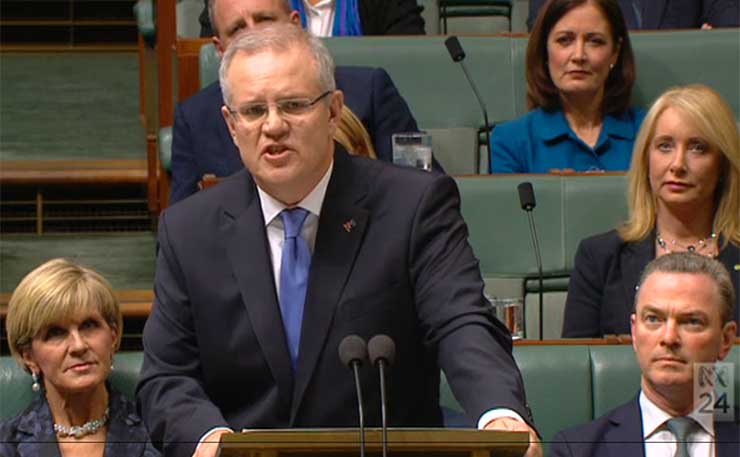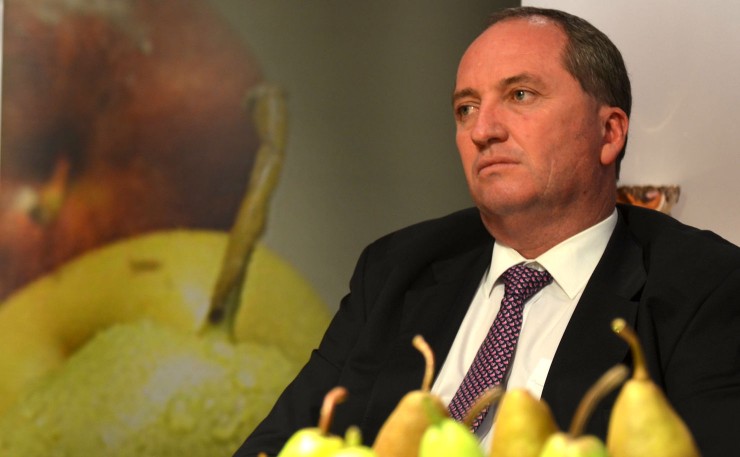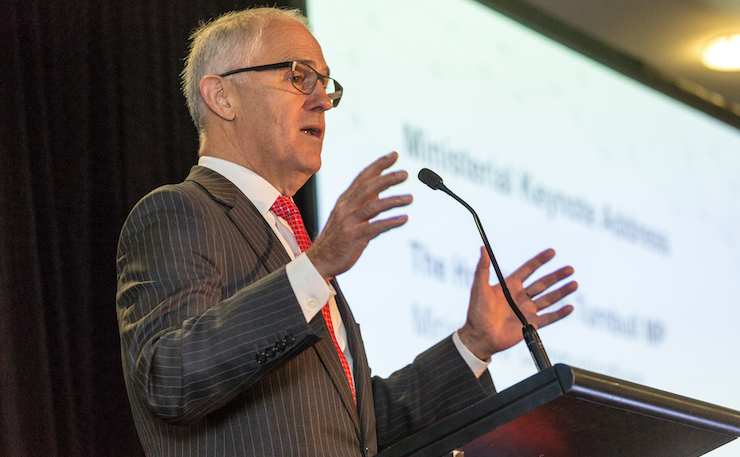Our economic future looks increasingly rocky. But thanks to a hapless government, many Australians remain blissfully unaware, writes Ian McAuley.
A cynic might believe that the government has deliberately concentrated its embarrassments in one short period in order to distract attention from a flow of bad economic news and a swag of unpopular policy proposals.
The government has been doing some hard travelling – the Abbott-Turnbull stoush over pre-selection, Sinodinos’s hints about the return of Abbott as Prime Minister, Gleeson’s resignation and the revelation of Paul Grimes’ sacking. That all follows the government’s “gun week”, and has continued to push economics off the mainstream media’s front pages.
The bad economic news started in late September when the ABS released housing price data, showing that our housing boom shows no sign of cooling.
Almost everyone who isn’t a property speculator or a member of the Coalition front bench warns that the longer the bubble expands the worse will be the consequences when it collapses. But Treasurer Morrison’s response was a speech dismissing the influence of tax-privileged property “investors”, defending negative gearing and suggesting that the solution lies in states reducing regulation and releasing more land on the margins of our already over-sprawled cities.
Then, on October 20, the ABS released September labour force data, revealing a one-month loss of 53,000 full-time jobs (confirming a trend evident for the last year) and a continuing fall in the participation rate. For an in-depth analysis of the labour force, I commend Greg Jericho’s Guardian article “How the unemployment rate hides what is happening in the economy”: drawing on ABS data it reveals some worrying trends that the government would prefer not to talk about.

To cap it off, last Wednesday saw the release of the September quarter Consumer Price Index, revealing CPI inflation of 1.3 per cent over the year. In times past governments would have been thrilled by a low CPI, but one doesn’t have to drill down very far to see what lies behind these headline figures.
There have been big price rises in electricity (remember Abbott’s promise when he repealed the carbon tax?), health care, and school education. These are all areas where privatisation and cuts in public funding have forced more costs on to consumers – often the most vulnerable. As Miriam Lyons and I point out, we pay a high price for the conservatives’ obsession with “small government”.
These high price rises are offset by price falls or price stagnation in the rest of the economy. It looks like the 2015 Christmas sales will morph into the 2016 Christmas and post-Christmas sales.
Undeterred by signs of a languishing economy, however, the government has pressed ahead with its poorly-considered proposals on paid parental leave and taxes on young visitors on working holidays (perhaps they’re really trying to protect us from young foreigners who will corrupt our native youth with stories about free universities and generous child care).
News of the collapse of Senator Bob Day’s building company and illegal operations by Melbourne property developers who destroyed a heritage building without approval has not deterred the government from pushing ahead with its proposal to resurrect the Australian Building and Construction Commission – a body with powers that override the normal safeguards of the law, that in its time did nothing to resolve the systemic problems in the industry and that focussed its attention almost entirely on the building unions.
Undaunted, the government is once again pressing for company tax cuts – cuts which, because of our dividend imputation system, would be of most benefit to foreign firms.
These cuts attempt to prolong the life of an economic model that may have had some justification in the 1950s, but which is now taking us towards a national debt crisis. That model relies on foreign investment inflows to support a deficit on current account, or in simple terms, borrowing from the rest of the world to support our material standard of living.
It got us some car plants and it got Menzies through a few elections, all the while accumulating a huge foreign debt – overwhelmingly private debt – and a liability to pay dividends to foreign investors.
Looking at the past week, our cynic may be forgiven for thinking that Turnbull has cleverly kept Barnaby Joyce and George Brandis in his cabinet as foils to make Morrison (and himself) look competent. But when conspiracy theories and sheer stupidity are competing explanations for bad policies, one should always go for stupidity, particularly in an outfit as disunited as the Turnbull Government.

In contrast to the din of confusion and political spin emanating from Canberra, the last few days have seen two significant non-partisan contributions to our economic debate.
One is from France’s Thomas Piketty, here to speak at Monash University and the Sydney Opera House, warning about the consequences of widening inequality. His 2014 book Capital in the Twenty-First Century carries a plain message: when the rate of return on capital is greater than economic growth, inequalities in wealth go on expanding, wrecking any principles of meritocracy, and leading eventually to social disruption (his Lateline interview with Emma Alberici conveys his main warnings on inequality). His book was prescient, because when he wrote it there was no sign of the coming Brexit and Trump phenomena.
Australia fits Piketty’s model of a country with self-perpetuating inequality. Thirty-five years of neoliberal policies have seen widening disparities in income, leading to widening (and comparatively intractable) disparities in wealth. Ours is no longer the land of the “fair go”; rather, we have become a land where there is little connection between one’s contribution and reward – a connection without which any economic system, capitalist or socialist, will fail.
Piketty suggests we re-introduce inheritance taxes (we had state inheritance taxes until 1977 when Queensland’s premier Bjelke-Petersen abolished them, leaving other states with no option but to follow suit). They would go some way to rectifying intergenerational inequities and would provide some protection against the development of a plutocracy sustained by inheritance.
Inheritance taxes send a message that just as society has contributed to whatever wealth we may have accumulated over our lifetime, we have an obligation back to society, not just to our immediate descendants.
They also remind us to bring up our children as members of society, rather than as members of a small family tribe. The term “family first” is not only the name of a far-right political party; it is also shorthand for the idea ,“Look after #1, #2, #3, #4 and perhaps the family dog, but don’t become concerned with anyone beyond the white picket fence – young people struggling to buy a house, people living in impoverished rural communities, refugees….”
The other policy contribution, along related lines, is from Tim Costello, releasing the Community Council’s Report The Australia We Want. In its introduction, Costello asks us to “imagine a humane and sustainable Australia, where people are more connected and engaged in the communities they live and work in, and where this involvement is reflected in the way we form policies and laws”.
Costello’s message is that we may be more decent and caring than the people we elect to our governments, in a process manipulated by rent seekers and other narrowly-focussed interest groups. In his Radio National interview introducing the work he stresses that life is “not just about me”. Rather “we’re in this together”, and we need a sense of connectedness.
It’s refreshing when someone from a faith-based background reminds us of our community obligations. After all, nowhere in the New Testament or in other religions’ scriptures do we find the term “family values” or the notion that we should confine our affections to our small tribe. In fact the message is entirely the opposite.
And it’s a welcome contrast to the espoused philosophy of Turnbull and his colleagues (many of whom also claim to have faith-based values) who assume that public policy must be based on the premise of individual short-term greed.
The Australia we want is something better – far better – than is envisaged by those who dominate our political debate.
Donate To New Matilda
New Matilda is a small, independent media outlet. We survive through reader contributions, and never losing a lawsuit. If you got something from this article, giving something back helps us to continue speaking truth to power. Every little bit counts.





